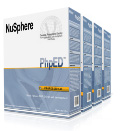PHP History
|
The History of PHP
PHP is an "HTML-embedded scripting language" primarily used for dynamic Web applications. The first part of this definition means that PHP code can be interspersed with HTML, making it simple to generate dynamic pieces of Web pages on the fly. As a scripting language, PHP code requires the presence of the PHP processor. PHP code is normally run in plain-text scripts that will only run on PHP-enabled computers (conversely programming languages can create standalone binary executable files, a.k.a. programs). PHP takes most of its syntax from C, Java, and Perl. It is an open source technology and runs on most operating systems and with most Web servers.
PHP was written in the C programming language by Rasmus Lerdorf in 1994 for use in monitoring his online resume and related personal information. For this reason, PHP originally stood for "Personal Home Page". Lerdorf combined PHP with his own Form Interpreter, releasing the combination publicly as PHP/FI (generally referred to as PHP 2.0) on June 8, 1995.
Two programmers, Zeev Suraski and Andi Gutmans, rebuilt PHP's core, releasing the updated result as PHP/FI 2 in 1997. The acronym was formally changed to PHP: HyperText Preprocessor, at this time. (This is an example of a recursive acronym: where the acronym itself is in its own definition.) In 1998, PHP 3 was released, which was the first widely used version.
PHP 4 was released in May 2000, with a new core, known as the Zend Engine 1.0. PHP 4 featured improved speed and reliability over PHP 3. In terms of features, PHP 4 added references, the Boolean type, COM support on Windows, output buffering, many new array functions, expanded object-oriented programming, inclusion of the PCRE library, and more. Maintenance releases of PHP 4 are still available, primarily for security updates.
PHP 5 was released in July 2004, with the updated Zend Engine 2.0. Among the many new features in PHP 5 are:
- improved object-oriented programming
- embedded SQLite
- support for new MySQL features (see the image at right)
- exception handling using a try..catch structure
- integrated SOAP support (see the image at right)
- the Filter library (in PHP 5.1)
- better XML tools
- iterators
and much, much more.
PHP 6 has been in development since October of 2006. The most significant change will be native support for Unicode. Unpopular, deprecated features such as Magic Quotes, register_globals, safe_mode, and the HTTP_*_VARS variables will disappear in PHP 6.
Although PHP is still primarily used for server-side generation of Web pages, it can also be used to perform command-line scripting or to create graphical applications with the help of GTK+.
[[We should add some discussion of the history of NuSphere and PhpED here but I couldn't find anything that specific on your site.]]
|
|
 Download NuSphere PHP IDE Download NuSphere PHP IDE
Download a free trial of the fast PHP EDitor and robust Integrated Development Environment for PHP.
|
 Buy NuSphere PhpED® now Buy NuSphere PhpED® now
|
 Special Team4 Offer Special Team4 Offer
Get 4 copies of PhpED for the price of 3!
Optimum solution for development teams.
|

|
|
Need more than 4 licenses? Contact Us for more quantity discounts, please use "Ordering/Payment issue" subject on the form.
|
|
"To be honest its bloody awesome, I have looked at loads of PHP editors and this is THE only one that actual works straight out of the box!!! Brilliant, well done."
Andrew Breward,
Director of Technology
caboodal.com
|
|